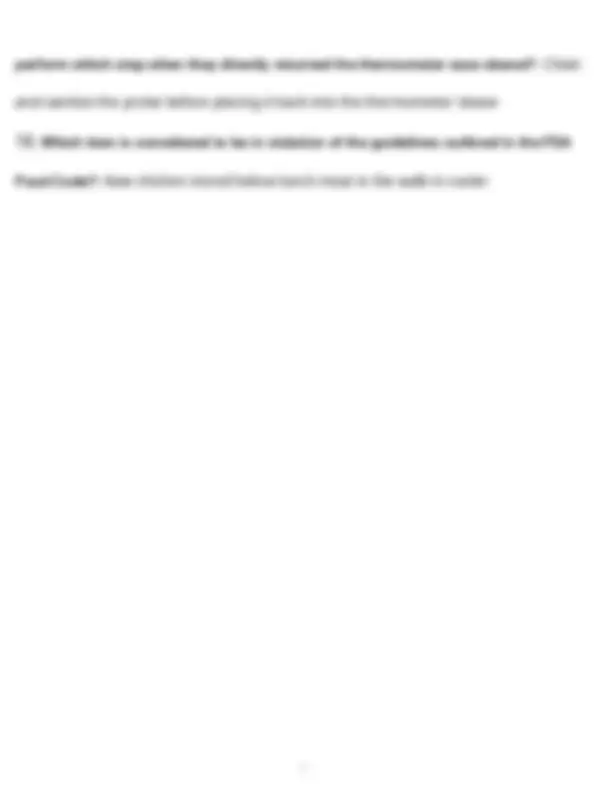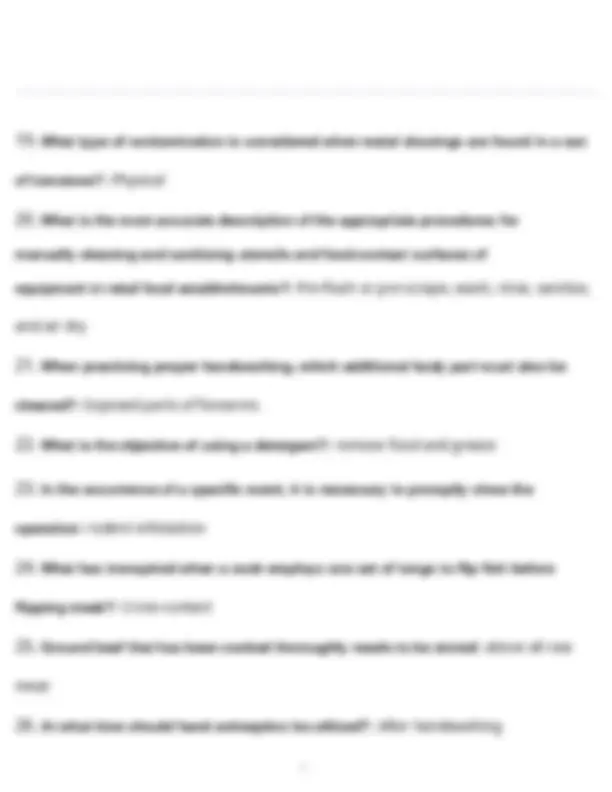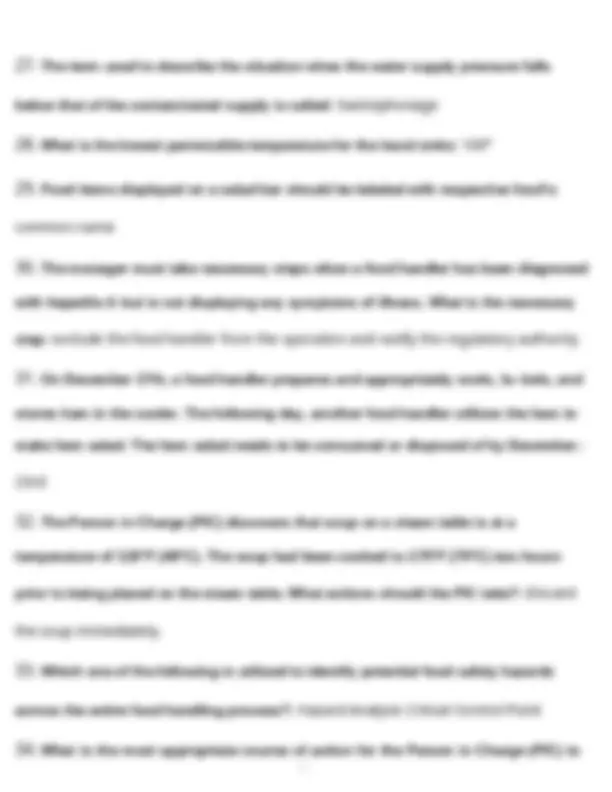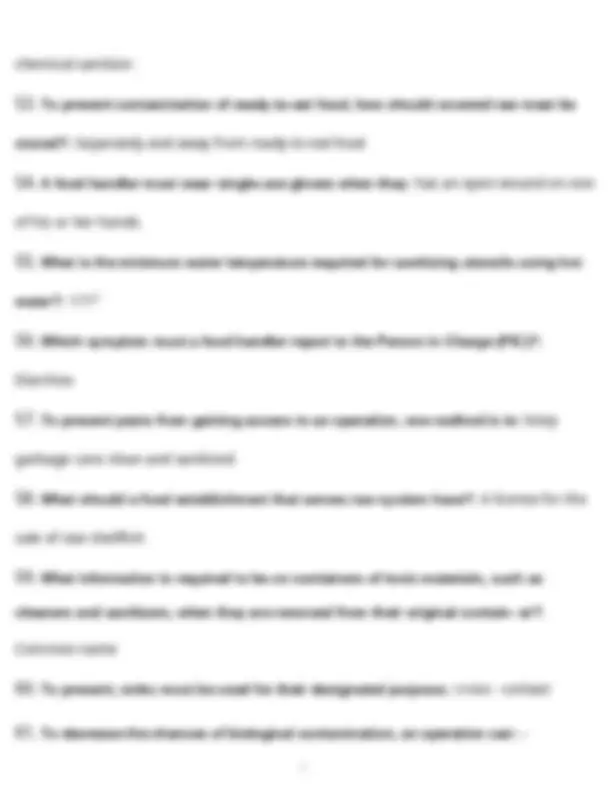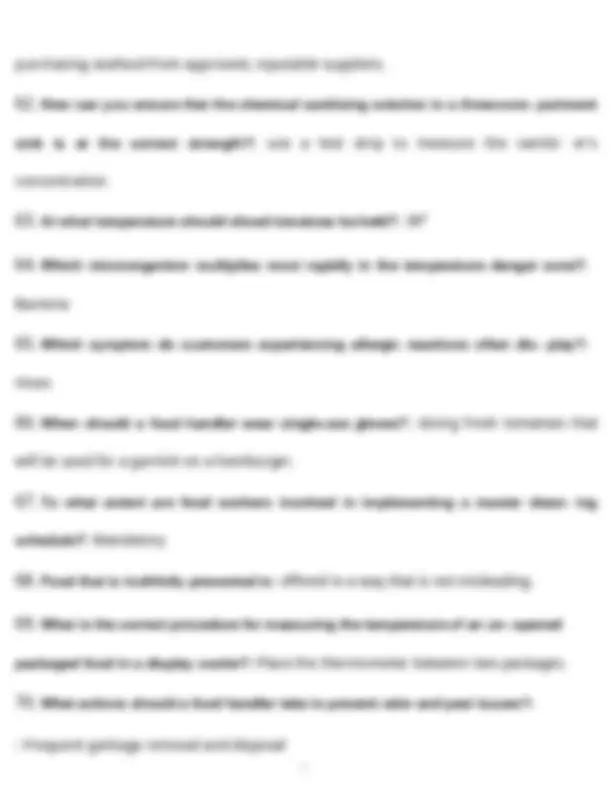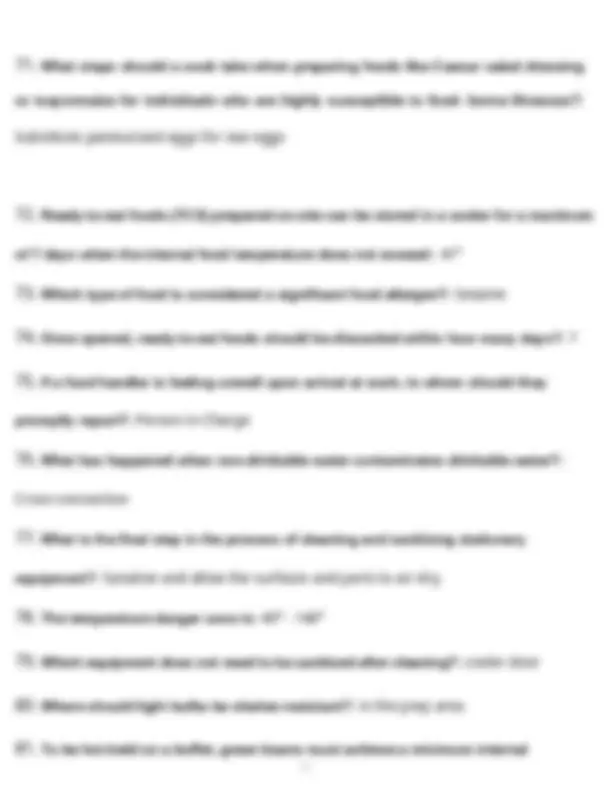Download ServSafe Practice Test Questions with Ssolutions and more Exams Food science in PDF only on Docsity!
1 /
ServSafe Practice Test Questions with Ssolutions
1. Garbage containers used by a business should be: waterproof, easy to clean, leak-
proof, and durable
2. A container of chicken salad is held at 41° with a prep date of December 17th. On
December 23rd, the chicken salad should be: discarded
3. Which food items provide an ideal environment for pathogen growth: un- cooked
rice
4. Which of these is created to identify food safety risks throughout the flow of food:
Hazard Analysis Critical Control Point
5. What is the correct temperature of the three-compartment sink?: 110°
6. The best location for chemical detergents and sanitizers to be stored is: in a storage
area next to single-service items
7. When cooking Salmon, it must reach which minimum internal temperature for 15
seconds: 145°
8. Which organization certifies and or classifies equipment for food prepara- tion and
sanitation: an ANSI accredited certification program
9. Which foodborne illness is usually caused by incorrectly canned food?: -
2 / Botulism
10. Apart from ensuring that deli meats are stored at a safe cold-holding temperature,
another food safety measure involves: date marking foods with a maximum of seven daysonce open or prepared
11. What happens when non-potable water contaminates drinkable water?: -
cross-connection
12. What is the final step in the process of cleaning and sanitizing stationary
equipment?: sanitize and allow the surfaces and parts to air dry
13. The minimum required temperature for the final hot water sanitizing rinse in a
stationary rack single temperature machine is: 180°
14. What is the meaning of the acronym FATTOM?: Conditions that favor the
growth of most foodborne pathogens
15. What are the two items that can be obtained at a temperature of 45°: Shell eggs and
live claims
16. When a food handler has been diagnosed with hepatitis A but is not dis- playing
any symptoms of illness, the manager must: exclude the food handler from the operation and notify the regulatory authority
17. After verifying the internal temperature of a food, a food employee neglect- ed to
4 /
19. What type of contamination is considered when metal shavings are found in a can
of tomatoes?: Physical
20. What is the most accurate description of the appropriate procedures for
manually cleaning and sanitizing utensils and food-contact surfaces of equipment in retail food establishments?: Pre-flush or pre-scrape, wash, rinse, sanitize, and air dry
21. When practicing proper handwashing, which additional body part must also be
cleaned?: Exposed parts of forearms
22. What is the objective of using a detergent?: remove food and grease
23. In the occurrence of a specific event, it is necessary to promptly close the
operation: rodent infestation
24. What has transpired when a cook employs one set of tongs to flip fish before
flipping steak?: Cross-contact
25. Ground beef that has been cooked thoroughly needs to be stored: above all raw
meat
26. At what time should hand antiseptics be utilized?: After handwashing
5 /
27. The term used to describe the situation when the water supply pressure falls
below that of the contaminated supply is called: backsiphonage
28. What is the lowest permissible temperature for the hand sinks: 100°
29. Food items displayed on a salad bar should be labeled with respective food's:
common name
30. The manager must take necessary steps when a food handler has been diagnosed
with hepatitis A but is not displaying any symptoms of illness. What is the necessary step: exclude the food handler from the operation and notify the regulatory authority
31. On December 17th, a food handler prepares and appropriately cools, la- bels, and
stores ham in the cooler. The following day, another food handler utilizes the ham to make ham salad. The ham salad needs to be consumed or disposed of by December.: 23rd
32. The Person in Charge (PIC) discovers that soup on a steam table is at a
temperature of 119°F (48°C). The soup had been cooked to 175°F (79°C) two hours prior to being placed on the steam table. What actions should the PIC take?: Discard the soup immediately.
33. Which one of the following is utilized to identify potential food safety hazards
across the entire food handling process?: Hazard Analysis Critical Control Point
34. What is the most appropriate course of action for the Person in Charge (PIC) to
7 /
44. Before transitioning from handling raw food to ready-to-eat food, food handlers
must first perform the following steps to prevent cross-contamina- tion.: wash their hands
45. When monitoring and supervising employee health, the Person in Charge (PIC)
must ensure that: all employees know and understand their responsibilities in reporting symptoms and illnesses.
46. What precautions can a food handler with a runny nose take to ensure food safety?:
Restrict work to non-food duties.
47. Exterior waste receptacles should be: sealed with tight-fitting lids.
48. Which measure would aid in safeguarding food against contamination by both
food handlers and customers?: Installing sneeze guards above the salad bar
49. What is the appropriate distance from the countertop for installing equip- ment to
ensure proper cleaning?: 4 inches
50. To maintain the proper temperature for cooked food that is being kept hot for
service, it must be held at a minimum temperature of: 135°
51. When a cook checks the temperature of beef stew being reheated for hot-
holding, which HACCP principle is being implemented?: Monitoring
52. The delay in air drying cups and glasses may be caused by: an improper use of
8 / chemical sanitizer.
53. To prevent contamination of ready-to-eat food, how should covered raw meat be
stored?: Separately and away from ready-to-eat food
54. A food handler must wear single-use gloves when they: has an open wound on one
of his or her hands.
55. What is the minimum water temperature required for sanitizing utensils using hot
water?: 171°
56. Which symptom must a food handler report to the Person in Charge (PIC)?:
Diarrhea
57. To prevent pests from gaining access to an operation, one method is to: keep
garbage cans clean and sanitized.
58. What should a food establishment that serves raw oysters have?: A license for the
sale of raw shellfish
59. What information is required to be on containers of toxic materials, such as
cleaners and sanitizers, when they are removed from their original contain- er?: Common name
60. To prevent, sinks must be used for their designated purpose.: cross - contact
61. To decrease the chances of biological contamination, an operation can: -
10 /
71. What steps should a cook take when preparing foods like Caesar salad dressing
or mayonnaise for individuals who are highly susceptible to food- borne illnesses?: Substitute pasteurized eggs for raw eggs
72. Ready-to-eat foods (TCS) prepared on-site can be stored in a cooler for a maximum
of 7 days when the internal food temperature does not exceed:: 41°
73. Which type of food is considered a significant food allergen?: Sesame
74. Once opened, ready-to-eat foods should be discarded within how many days?: 7
75. If a food handler is feeling unwell upon arrival at work, to whom should they
promptly report?: Person in Charge
76. What has happened when non-drinkable water contaminates drinkable water?:
Cross-connection
77. What is the final step in the process of cleaning and sanitizing stationary
equipment?: Sanatize and allow the surfaces and parts to air dry.
78. The temperature danger zone is: 40° - 140°
79. Which equipment does not need to be sanitized after cleaning?: cooler door
80. Where should light bulbs be shatter-resistant?: in the prep area
81. To be hot-held on a buffet, green beans must achieve a minimum internal
11 / temperature of: 135°
82. What should a food handler do if a customer with a food allergy is mistak- enly
served a dish containing the allergen?: warn the guest
83. Who should apply pesticides?: pest control operator
84. What does the acronym ALERT represent in a food safety system?: prevent or
reduce the risk of intentional food contamination
85. What is the last step a food handler should take before handling ready-
to-eat foods?: put on single use gloves
86. When food items like potato salad or tuna salad become a source of foodborne
illness, what are the most common reasons for this?: mayonnaise
87. If it is not possible to install a backflow prevention device, what alternative method
can be employed to prevent backsiphonage?: air gap
88. What could be a potential source of contamination for an outdoor tempo- rary
serving location.: dirt floors
89. The presence of harmful toxins leads to the occurrence of ciguatera.: fish
90. Several factors can influence the effectiveness of sanitizing solutions.: -
Such as concentration, temperature, contact time, water hardness, and pH.

